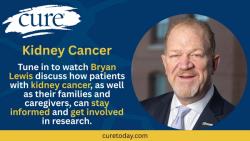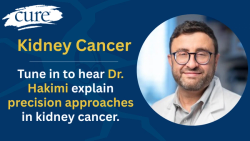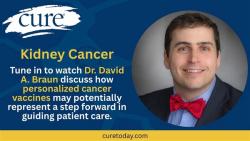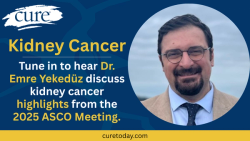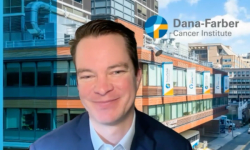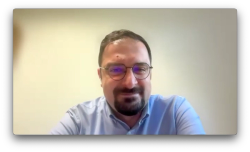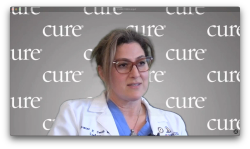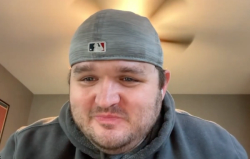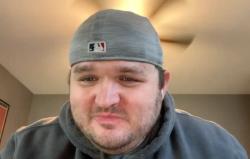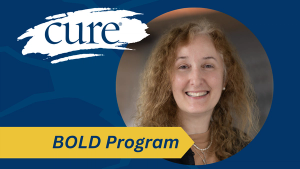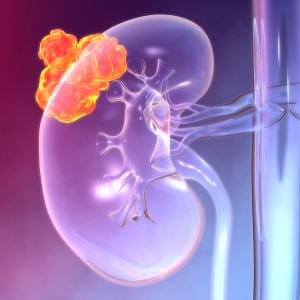Receiving a Diagnosis of Metastatic RCC: A Patient’s Journey
Patient Meryl Uranga describes how she was diagnosed with metastatic clear cell renal cell carcinoma and the initial treatments she received.
Chung-Han Lee, M.D.: Ms. Uranga, talk a little about your diagnosis of metastatic kidney cancer and your initial treatment journey.
Meryl Uranga: I was diagnosed incidentally, which happens in a great majority of the cases, as you mentioned. I was in an ED [emergency department] for appendicitis. I had an abdominal scan, and I did have appendicitis, but I was also told that I had a large kidney mass. My world turned upside down with that. It was a bit of a whirlwind after I had the appendectomy and then was immediately thrown in with urology and oncology. They also saw what appeared to be a mass in my lung on the same scan, so there had to be a lot of additional testing. I had a bronchoscopy to confirm that it was kidney cancer in my lung as well.
At that point, it appeared that was it, so the decision was made to treat it locally. I had a nephrectomy three or four weeks later. As soon as I recovered, I had a lobectomy and had one of my lung lobes removed. Prior to the lobectomy, the thoracic surgeon insisted on a brain MRI to make sure that there was nothing going on there. I had a brain CT with all the initial testing, but I’ve come to learn that CT isn’t very good imaging for the brain. When I had the MRI, there was also a brain lesion noted. About a week after the lobectomy, I had Gamma Knife radiation treatment to my brain. At that point, I was considered cancer-free. There was no visible evidence of any other cancer at that point. I didn’t start on systemic therapy at that point.
Chung-Han Lee, M.D.: Ms Uranga, after you were first diagnosed, what resources were you looking at? How did you get yourself better educated about the disease?
Meryl Uranga: At the beginning, when I was going through procedure after procedure, I was avoiding information. I had family and friends telling me to avoid information. I guess they had been googling and said, “You don’t need to look at that stuff.” And I couldn’t. I didn’t have the focus or energy for it. I was having so many medical procedures done and recovering. But once I started recovering and gaining strength, I dug in.
One of the first things I found that ended up being life changing was a website for a support group. I came across it as a support group, but it became a huge educational source for me as well. I’ve met people there. That’s where I was exposed to KidneyCAN, which I’ve gone on to become a proud volunteer for. The website is called Smart Patients. I was able to talk to other people there. I was able to read stories. I was able to get an idea of what I was up against.
The No. 1 thing I learned that changed the course of my treatment, my mentality, everything, was that I was in the wrong place for treatment. I was in a community hospital setting with a general oncologist who saw maybe a couple of cases a year of kidney cancer, if that. I quickly learned that I needed to get into an academic center with a specialist and that it would be the difference for me in terms of treatment. Since then, I’ve been very much aware of the fact that that did make all the difference. I started moving very quickly, getting into the academic center where I live and finding the right fit for me in terms of the doctor. I even went to another state for a second opinion when it came time to start the systemic treatment to make sure I was about to undergo the right first treatment, which we can hit on later. That’s how I started getting empowered to take control of my treatment and understand what was going on with me.
Chung-Han Lee, M.D.: Yes. That’s what we often see with a lot of patients, that it’s this whirlwind of getting over that initial shock of the diagnosis and information coming at you from multiple directions. It’s great that you were able to be your own advocate and take a very active role in understanding it and connecting with others.
Transcript edited for clarity.
Related Content
 Top 10 Cancer Care Updates of 2025: What Patients Should Know
Top 10 Cancer Care Updates of 2025: What Patients Should KnowDecember 22nd 2025
 Palliative Care in Kidney Cancer More Than Just Relieving Symptoms
Palliative Care in Kidney Cancer More Than Just Relieving SymptomsSeptember 26th 2024
View additional resources on CureToday.com


